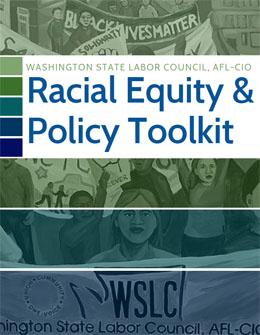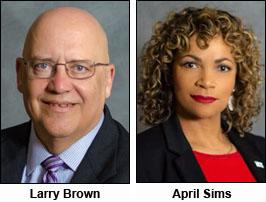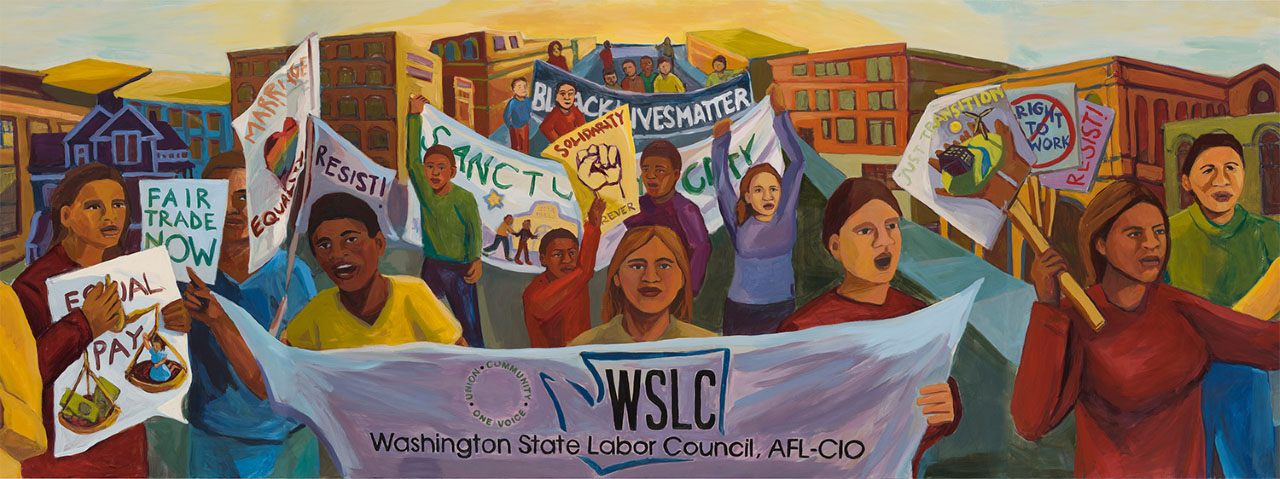W.S.L.C.
WSLC offers Racial Equity & Policy Toolkit
This toolkit will serve as a guide for the WSLC’s legislative program as we continue to build power for all working people and integrate racial equity into all that we do.
 The Washington State Labor Council, AFL-CIO (WSLC) is proud to announce the virtual launch of the WSLC Racial Equity & Policy Toolkit, expanding our work on Race & Labor through public policy approaches. To meet the needs of union members, working people and growing demand for racial and economic justice in our state, this customized tool will help the United Labor Lobby, a statewide coalition of union and advocacy groups, promote racial equity in policy creation and support. WSLC Government Affairs Director Joe Kendo and WSLC Legislative Director Sybill Hyppolite also worked with affiliates to create the 2022 Workers’ Recovery Agenda for this year’s legislative session. (See more details at The Stand.) In addition to the tool and toolkit, the WSLC has created a series of workshops to establish a baseline for racial equity concepts in policy in partnership with Marlysa Gamblin of www.gamblinconsults.com.
The Washington State Labor Council, AFL-CIO (WSLC) is proud to announce the virtual launch of the WSLC Racial Equity & Policy Toolkit, expanding our work on Race & Labor through public policy approaches. To meet the needs of union members, working people and growing demand for racial and economic justice in our state, this customized tool will help the United Labor Lobby, a statewide coalition of union and advocacy groups, promote racial equity in policy creation and support. WSLC Government Affairs Director Joe Kendo and WSLC Legislative Director Sybill Hyppolite also worked with affiliates to create the 2022 Workers’ Recovery Agenda for this year’s legislative session. (See more details at The Stand.) In addition to the tool and toolkit, the WSLC has created a series of workshops to establish a baseline for racial equity concepts in policy in partnership with Marlysa Gamblin of www.gamblinconsults.com.
Check out the WSLC Racial Equity & Policy Toolkit online at www.wslc.org/racial-equity-toolkit. It will serve as a guide for our legislative program as we continue to build power for all working people and integrate racial equity into all that we do.
By LARRY BROWN and APRIL SIMS
(Jan. 31, 2022) — The Constitution of the Washington State Labor Council, AFL-CIO guides our work and charges us to “combat resolutely the forces that seek to undermine the democratic institutions of our nation and to enslave the human soul.” The preamble continues by calling on us to “strive always to win full respect for the dignity of the human individual whom our unions serve.” Institutional racism and systemic policies that disadvantage Black, Indigenous, and people of color (BIPOC*) are such forces. As the elected leaders of the WSLC, which is formed of more than 600 local unions, organizations, and councils representing over 1/2 million working people in Washington State, it is our duty to fight for racial and economic justice.
We are charged to win gains and power for working people. We recognize that the fate of all workers, regardless of color or background, are interconnected and that we either rise together or fail. Racism is a system of oppression designed to divide the working class so the wealthy elite can consolidate their wealth and power at the very top. We will win when all workers are recognized and empowered. By acknowledging that racial justice and economic justice are inextricably linked, we commit to sharing the responsibility for racial justice and equity, and actively work together to achieve the transformation we aspire in our unions, workplaces and in the community.
Since 2015, the WSLC has developed and run anti-racist training, designed for leaders and rank-and-file membership to grow collective consciousness about our role fighting white supremacy and building a more inclusive labor movement for all workers. Resolutions passed by WSLC affiliates guide our work and lay plain our trajectory:
- Our history: “race and the course of organized labor are inextricably bound and have been since workers made their first appearance on the shores of North America”
- Our current challenge: “organized labor needs to develop a robust counter narrative to that offered by right-wing populism.”
- The work we must take on: “unions need to integrate racial justice into every area of their organization… to wholeheartedly combat the divide and conquer strategy of our enemies.”
The WSLC’s 2019 Resolution on Race and the Labor Movement 3.0 called on us to create additional and supplemental modules to further expand our Race and Labor work. This toolkit — the “WSLC Racial Equity & Policy Toolkit” — is an expansion of our program, made possible by the engagement and support of the WSLC’s affiliated unions commitment to racial and economic justice and the growing necessity to examine labor’s work in the legislative space. By examining our labor policies to ensure they promote and advance racial equity, our unions, workplaces and communities will be transformed for the betterment of all people.
The work we pride ourselves on as a labor movement – better wages, benefits and working conditions – starts with policy. The procedures, regulations and practices within our collective bargaining agreements are policy. And while this toolkit examines policies as laws, our work to examine our policies extends beyond the legislative policies we create and support. It is our hope that this toolkit and the practice of engaging the voices, leadership, needs, and power of Black, Indigenous and People of Color will extend beyond legislative policy and permeate our unions halls and the decisions we make daily to strengthen the labor movement.
Black workers, who represent 13.5% of union members, are the most likely of any racial demographic group to be union members. The union advantage is greater for Black and Latinx workers, who are paid 13.7% and 20.1% more, respectively, when they belong to a union. While people of color will become a majority of the American working class in 2032, the decline of unionization has played a significant role in the expansion of the racial wage gap over the past four decades, and an increase in unionization would help reverse this trend.
 In a 2020 Report by the Washington State Labor Education Research Center, we learned just under half of the state’s workforce (1.4 million people) were deemed “essential” yet worked in high-hazard occupations during the COVID-19 pandemic. These workers are disproportionately Black, Indigenous and people of color without the protections of a union contract. This is our moment. Union favorability is at an all time high. If we are to seize this opportunity and grow our unions, the intersection of racial and economic justice is where we begin.
In a 2020 Report by the Washington State Labor Education Research Center, we learned just under half of the state’s workforce (1.4 million people) were deemed “essential” yet worked in high-hazard occupations during the COVID-19 pandemic. These workers are disproportionately Black, Indigenous and people of color without the protections of a union contract. This is our moment. Union favorability is at an all time high. If we are to seize this opportunity and grow our unions, the intersection of racial and economic justice is where we begin.
It is not lost on us that racism continues to be promoted by corporations and extremist antilabor and anti-democratic forces as a means to divide working people and weaken our political and economic power with the aim of imposing austerity, the destruction of unions and the crippling of all democratic institutions and rights. Racism is corrosive to both the labor movement and democracy. Voter suppression and the attacks on voting rights are deliberately racist and an attempt to silence the voices of people of color. In our communities, we must defend voting rights and in our union halls we must center the voices and needs of people of color in our fight for racial and economic justice.
As we work on policy and work to promote a racial equity lens in the full policy process, we have an opportunity to reexamine the age-old adage that “a rising tide lifts all boats.” If we are to strengthen our labor movement and ensure it is a movement that all working people want to join, we must do the work of (1) promoting policy that eliminates current racial divides, (2) consider the impacts of our policies on BIPOC, (3) center the voices of BIPOC in policy creation, (4) consider the barriers to policy that creates more equitable outcomes, and (5) mitigate the negative impacts of past policies on BIPOC. That is where policy work begins and this toolkit invites us as a labor movement to move beyond broad-based policy approaches to entirely racially equitable policies that provide effective ways to eliminate current racial divides.
This pandemic and the wave of heightened union activism has ignited a fire in us all. As workers strike, walk off the job, and take to the streets to demand our voices be heard, we are reminded of our power. Working people joining together in solidarity with co-workers of all colors and backgrounds won increased wages, strengthened safety protections, better benefits, and a fair return on our work. There is dignity in all work and working people have demanded and are winning respect. As we grow and build a stronger anti-racist labor movement, more workers will win. Our power lies in our ability to come together in union – across race and place – because the union makes us strong.
Solidarity Forever.
 Larry Brown is President and April Sims is Secretary Treasurer of the Washington State Labor Council, AFL-CIO. The WSLC is the largest union organization in Washington, representing the interests of more than 550,000 rank-and-file members in some 600 union locals and councils. Learn more at www.wslc.org.
Larry Brown is President and April Sims is Secretary Treasurer of the Washington State Labor Council, AFL-CIO. The WSLC is the largest union organization in Washington, representing the interests of more than 550,000 rank-and-file members in some 600 union locals and councils. Learn more at www.wslc.org.






